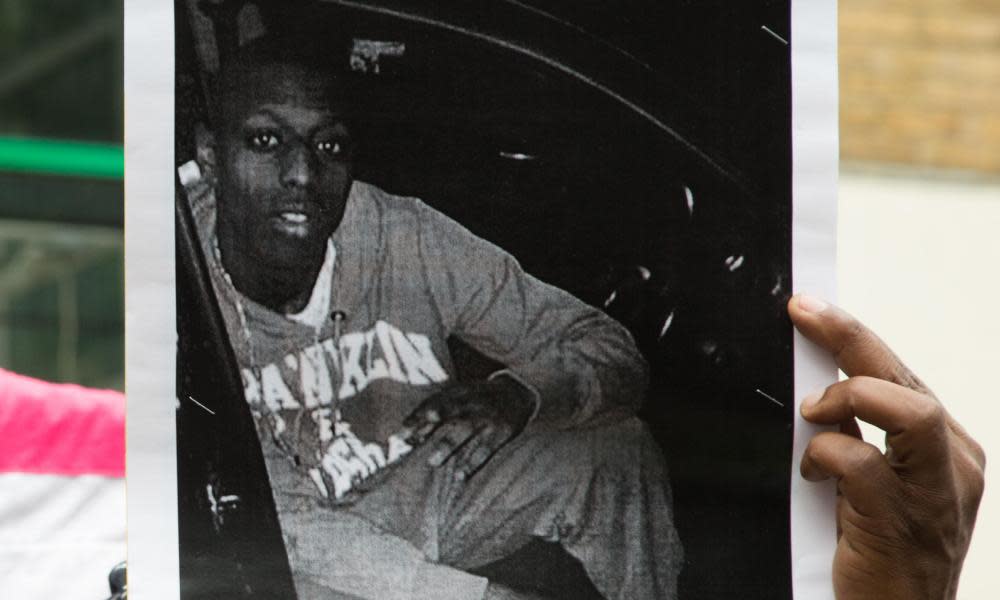Police officer in death case resigned before disciplinary action

The only police officer due to face misconduct proceedings over the death of a black man resigned before a disciplinary hearing could take place, the Observer can reveal.
Witnesses claimed that the officer sprayed CS gas into the face of Edson Da Costa, and this could have “contributed” to his death according to an independent expert. The officer resigned more than 12 months ago – but the family was never told.
Two other officers were also due to face “management action” over the death of Da Costa, this time for failing to ensure that an ambulance was called quickly enough. The family has still not been told what disciplinary action took place and when. It is not known if the officer who resigned in October 2019 before his misconduct hearing moved to another force.
Da Costa, a 25-year-old father, died after he was restrained by four plain-clothed police officers in east London in 2017 following a traffic stop. Learning that the one officer facing misconduct proceedings over the death of his son had resigned more than a year ago, Da Costa’s father Ginario said: “This is a joke. Why are they not accepting blame, why have they not apologised to the family?”
The family is also concerned that during the inquest into Da Costa’s death, the coroner asked jurors to reveal if they or any family members had been “involved in any campaign groups such as Black Lives Matter”, raising concerns over discrimination.
Last night a spokesperson for the Black Lives Matter movement, which has organised global protests following the death of George Floyd at the hands of US police, called it an “attack on the freedom of association”.
They added: “Support for black lives cannot and should not mean exclusion from any area of civic life.”
An Observer investigation into Da Costa’s death has uncovered concerns about the behaviour of the officers, including questions over why he was stopped in the first place and how he was treated after he was subdued.
News that no officer has faced any misconduct action over Da Costa’s death has infuriated the family and is likely to further fracture trust between police and black communities following claims of discrimination on issues such as stop and search.
Intensive-care expert Professor Jerry Nolan, who examined the case, said that the spraying of CS gas at close range could have been a “contributory factor” in Da Costa’s death.
Two witnesses say that the officer was roughly 6cm away from Da Costa when he sprayed, contravening guidance that CS gas should not be used less than a metre from its target.
When the officer was later questioned by investigators from the Independent Office for Police Conduct (IOPC), he refused to “confirm or deny that he had discharged his spray at close range”.
The IOPC investigators also found that the officer had told the ambulance control-room that Da Costa was conscious and responsive, although in a statement he said he had told ambulance officials he was unconscious.
“[The officer] had a duty to Da Costa to preserve life, but evidence indicates he may have failed to perform that duty to a satisfactory standard,” said the IOPC in its conclusions.
It added: “The evidence suggests a reasonable tribunal, properly directed, could find misconduct relating to his use of CS spray.”
On Friday night an email from family lawyers alerted the Da Costa family to the situation and said that they were asking for “an explanation from the MPS [Metropolitan Police Service] as to how and why you were not informed by them of the outcome and for an apology”.
On Saturday a Met spokesperson said: “A human error meant, unfortunately, that the IOPC were not informed of the outcome.” However they added that the watchdog had since been informed, and the family had since been briefed.
“Once this omission in the process was learnt of, staff worked swiftly to notify the IOPC, and expressed their regret over this error. We understand the family have been updated by the IOPC,” said the spokesperson.
An inquest found that Da Costa had died by misadventure after being restrained face down by police after swallowing 88 wraps of drugs. The family wants a fresh inquest saying they were unhappy with several aspects of the proceedings.


